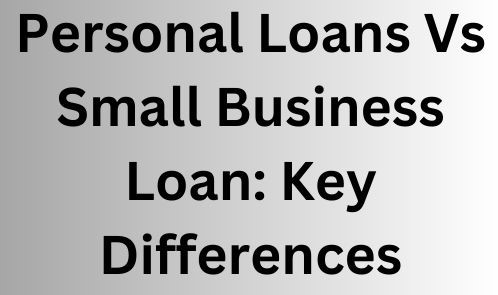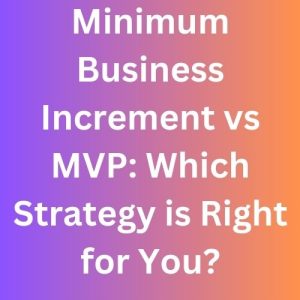
Personal Loans Vs Small Business Loan
Overview of Personal Loans
Introduction to Personal Loans Vs Small Business Loan
Welcome to HubWorld, we will be discussing about Personal Loans Vs Small Business Loan and their key differences, advantages, disadvantages, eligibility criteria, loans amount, interest rates, repayment methods and considerations of choosing the perfect loans for you.
What are Personal Loans
Personal loans are loans financial organizations use for individuals to obtain an unsecured loans for personal emergencies or expenses. It doesn’t require collateral because people without assets can get the loans. The repayment terms and fixed interest rates can provide easy budgeting because the repayment period are all set, interest rate, and the loan amount. The budgetary objectives or unforeseen costs are tools for adaptable financial instrument for creditworthiness and the borrower’s financial status. Financial circumstances of the borrower will be taken into account when obtaining a personal loan.
Advantages of Personal Loans
There are several benefits to personal loans such as: the flexibility is great for debt consolidation or medical costs or home improvements when it comes to emergencies. It is appropriate for pressing requirements due to the expeditious approval process and it remain the same for the duration of the loan as fixed interest rates. With unsecured loans it is not necessary to have a collateral and access to a bigger loan amounts will be possible compared to credit cards or payday loans. By demonstrating regular payments it show responsible borrowing behavior by improving the credit score. A reduced interest rate with several high interest loans is known as the debt consolidation process.
Disadvantages of Personal Loans
The other types of loans with interest rate are not greater than personal loans that comes with interest rates. Among other fees and charges or prepayment penalties or late payment can be increased by the origination on the cost of a personal loan. Harm can come to one’s credit rating or collection efforts which could result in lawsuits if there is a chance of default. To cover significant cost, secured loans will not be enough compare to smaller borrowing limits that has a restricted borrowing amounts on personal loans. When the debt levels are excessive or payments are late can have a detrimental effect on the credit score due to the influence of personal loans.
Overview of Small Business Loans
What are Small Business Loans
Small business loans are used by finance startup or small business to manage inventories or hiring personnel or expanding physical locations and various tasks. Due to their lower interest rates and flexible repayment arrangements small business like them. They are provided by internet leaders or credit unions or banks and government agencies. For the organizational objectives it is a useful instrument small business can use for the business.
Advantages of Small Business Loans
It can be used for marketing expenditures or providing funds for operations or buying equipment and others activities and are accessible to small company. The loan amounts or interest rates and the repayment terms offered by the loans flexibility makes it the best options for small businesses. Through the credit building the future loan qualification through the timely repayment facilitates the company’s credit history. Acquiring rival firm or growing their consumer bases and introducing new products assist the company growth to a leading opportunities. The competitive advantage that comes with extra revenue is to invest in staff training or marketing tactics and new technologies.
Disadvantages of Small Business Loans
Larger loans with higher interest rates sometimes have high interest rates with small business loans and it drives up expenses. Due to the loans shorter payback period are frequently necessary for higher monthly payments. If the collateral requirements of many lenders are unpaid the business is in danger. The restriction on loan amounts for small business loans are often smaller than those that are greater. For small enterprises with fewer tight standards can be more difficult to qualify for these loans.
Key Differences Between Personal Loans Vs Small Business Loan
Loan Amounts
Their maximum amounts are smaller towards personal costs for use intended towards personal loans. Small business loans are covered by the intended expenses of larger business. Greater maximum amounts and special demands of businesses are designed to meet the loans of small company. Personal loans can cover all of consolidating debt or paying for emergencies and rebuilding a home.
Interest Rates
A higher interest rates can result in the borrower’s creditworthiness and the personal loans of unsecured nature. When the assets of the company or the revenue streams are secured by small business loans the interest rates are lowered and the leader risk is minimized. Through the organizations or government programs rates are attractive and business may be eligible.
Repayment Terms
5 to 25 years are the repayment terms for small business loans while 1 to 5 years are shorter for repayment terms for personal loans. The payback periods are longer because it takes longer period to turn a profit in smaller companies. Small business provide two flexible repayment choices which are adjustable repayment plans and interest only payments. The terms of repayment are greatly impacted by viability of borrowing and the cost.
Collateral Requirements
Without collateral personal loans are available and can be obtained while the creditworthiness and borrower’s income depends on small business loans. Corporate assets or personal are commonly used as collateral to secure small business loans while business loans are riskers due to the default of likelihood being increased. The risk of the lender is lowered and recovery loss permits collateral if the event the borrower defaults.
Eligibility Criteria
To get personal loans there are consideration that need to be taken into account such as asset value or debt to income ratio or credit history and so on. The credit history or income or assets are taken into consideration as the financial stability of the enterprise to determine small business loans. Financial accounts and business plans are necessary for the eligibility criteria. The financial situation of individuals are based on the personal loans while the business financial health are based on the loans of small businesses.
Which Loan Is Best for You Between Personal Loans Vs Small Business Loan.
Considerations for Choosing a Personal Loan
Various lenders offer different interest rates and need to be compared. The related costs and the conditions of the loan should be taken into account. Prepayment penalties and the origination fees associated with other loans the cost must be understand. For the repayment flexible terms, speak with the lenders who provide the loans. The criteria of each lender’s minimal credit score must be known before acquiring the loan.
Considerations for Choosing a Business Loan
Extra costs or terms of repayment or qualifying requirements and the loan amount should be examine before choosing a business loan. The lender customer support and their standing with the creditworthiness should be assessed. Understand the organization financial stability and cash flow effect before applying. The needs and objectives should be closely matched before selecting the loan.
Conclusion
The individual needs or the initiatives of small company are appropriate for personal loans. Small business loans are well suited for expansions or efforts of larger business. The repayment terms or interest rates and the eligibility conditions should be taken into account because they are essential.
READ MORE ON Personal Loans Vs Small Business Loan: Key Differences
SEE MORE ON How to Successfully Start a Business with 10K

